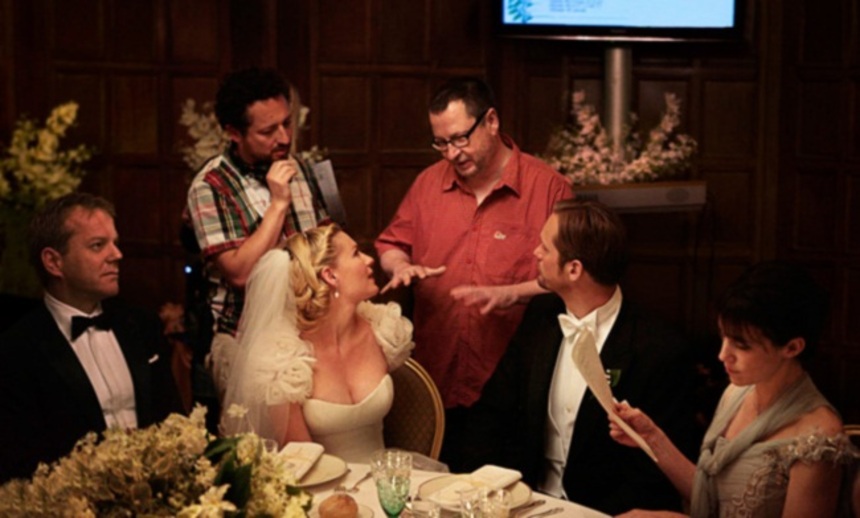Hey Toronto! Wait for the End of the World with Lars von Trier

I certainly break from Todd's very negative opinion on the auteur's latest and would go so far to say that it is some of the best, honest - whatever that word may mean to each person reading this - work he has done to date. It was of the best things I caught at this years edition of the Toronto International Film Festival.
With the upcoming Canadian release of Melancholia in early November, TIFF LIGHTBOX is playing host to a Lars von Trier retrospective which includes rare 35mm print screenings of The Element of Crime, The Idiots and Europa, along with more recent work including his big international successes Breaking The Waves, Dancer in the Dark, and Dogville.
Details from TIFF LIGHTBOX:
Perhaps the most influential--and certainly the most controversial--European filmmaker to emerge in the last quarter-century, master provocateur Lars von Trier has not only changed the face of his native Danish film industry but radically altered the way people think about film internationally. Flying in the face of the Danish penchant for staunchly realist period pieces, von Trier's early features The Element of Crime and Europa were highly stylized and aggressively postmodernist, inflecting the European art film with elements derived from science fiction and horror movies. This unique approach, along with von Trier's self-image as perpetual enfant terrible, brought the films almost immediate acclaim, with Europa winning major prizes at the Cannes Film Festival and von Trier being celebrated as the heir of the great European auteurs.Yet just as von Trier was coming to wide international attention in the early nineties, he opted to take a radical (and cannily self-promoting) left turn with his outrageous and notorious Dogme 95 manifesto, which boldly targeted both the technical and narrative norms of commercial cinema. The signatories of this "Vow of Chastity" swore to forego artificial lighting, makeup, overdubbed music, props and sets, special effects, any "superficial action" or generic conventions, and even the director's credit. Though von Trier's celebrated films Breaking the Waves and Dancer in the Dark broke as many Dogme tenets as they followed (von Trier in fact made only one "official" Dogme film, The Idiots), they still proffered a ferocious challenge to audience's sensibilities and assumptions--and ironically brought von Trier even greater international success, with Breaking the Waves winning the Grand Prix at Cannes and Dancer in the Dark taking the Palme d'Or. Von Trier followed these triumphs with the first two parts of his as yet unfinished trilogy on America, Dogville and the criminally underrated Manderlay. Sardonically undercutting the star-studded casts he assembled for these films, von Trier places his actors on patently false stage sets, with chalk lines marking the outlines of buildings and only the barest of props and costumes--a cheekily perverse following of the Dogme "rule" which heightens the films' artificiality rather than their authenticity.Though von Trier has been compared to such directors as Douglas Sirk, Ingmar Bergman and Carl Theodor Dreyer (whom he paid explicit homage to by filming the great Dane's script for Medea), he is perhaps closest in sensibility, if not in aesthetic, to revered Spanish surrealist Luis Buñuel. Like Buñuel, von Trier is acutely aware of our addiction to narrative, and mocks it savagely in virtually every one of his films. At the same time, narrative in von Trier is also a trap which closes ineluctably on his protagonists, who are often either unaware of their disastrous circumstances or incapable of saving themselves from them. (In this, almost all of von Trier's films play like horror movies.) His highly anticipated new film, Melancholia, takes this plight to its terrifyingly logical end, as the bitter feud between two sisters (Kirsten Dunst and Charlotte Gainsbourg) is mirrored in the impending collision between Earth and a rogue planet hurtling through space. This select retrospective, moving from raw realism to strikingly fabricated fantasy, showcases not only von Trier's incredible versatility and prolificacy, but also the haunting, deeply felt obsession with apocalypse--personal, societal, cosmic--that has been with him since the beginning. --Steve GravestockLars von Trier: Waiting for the End of the World runs November 9 - November 19 and includes his highly anticipated new film, Melancholia, which opens at TIFF Bell Lightbox on Friday, November 18.

Do you feel this content is inappropriate or infringes upon your rights? Click here to report it, or see our DMCA policy.






